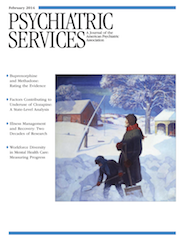Differences Between Parents of Young Versus Adult Children Seeking to Participate in Family-to-Family Psychoeducation
Abstract
Objective
Parents of individuals with mental illness often play a central role in initiating and supporting their children’s treatment. This study compared psychological symptoms and experiences of parents of younger versus older consumers. Parents were seeking to participate in a family education program for relatives of individuals with mental illness.
Methods
Domains of caregiving and distress were assessed among parents of youths (N=56), of young adults (N=137), and of adults ≥30 (N=72) who were seeking to participate in the National Alliance on Mental Illness Family-to-Family program.
Results
Parents of youths endorsed greater burden, difficulties, and emotional distress than parents of young adults, who in turn endorsed greater burden, difficulties, and emotional distress than parents of older adults.
Conclusions
Findings suggest that burden, difficulties, and emotional distress among parents seeking participation in this program may be highest when children with mental health concerns are younger and that the burdens recede as children age.



